 Petzlover
Petzlover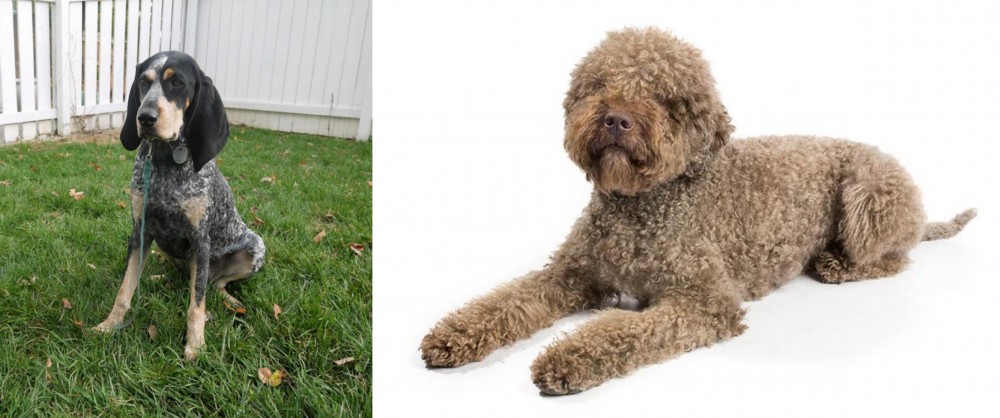 Grand Bleu de Gascogne is originated from France but Lagotto Romagnolo is originated from Italy. Grand Bleu de Gascogne may grow 24 cm / 10 inches higher than Lagotto Romagnolo. Grand Bleu de Gascogne may weigh 26 kg / 58 pounds more than Lagotto Romagnolo. Grand Bleu de Gascogne may live 5 years less than Lagotto Romagnolo. Both Grand Bleu de Gascogne and Lagotto Romagnolo has almost same litter size. Grand Bleu de Gascogne requires Low Maintenance. But Lagotto Romagnolo requires Moderate Maintenance
Grand Bleu de Gascogne is originated from France but Lagotto Romagnolo is originated from Italy. Grand Bleu de Gascogne may grow 24 cm / 10 inches higher than Lagotto Romagnolo. Grand Bleu de Gascogne may weigh 26 kg / 58 pounds more than Lagotto Romagnolo. Grand Bleu de Gascogne may live 5 years less than Lagotto Romagnolo. Both Grand Bleu de Gascogne and Lagotto Romagnolo has almost same litter size. Grand Bleu de Gascogne requires Low Maintenance. But Lagotto Romagnolo requires Moderate Maintenance
 The Grande Bleu de Gascogne is a dog which has descended from a line of French hounds. Originating in France, the dog is actually more common in the United States than in France.
The Grande Bleu de Gascogne is a dog which has descended from a line of French hounds. Originating in France, the dog is actually more common in the United States than in France.
They were bred to hunt, and today they continue to be used for hunting, but they double up as loyal pets too.
It is believed that they descended from dogs such as the St. Hubert Hound and the English Southern Hound. The dog itself has had an influence on the development of several scent-hound breeds.
In the United States, the Grande Bleu de Gascogne was bred in the 18th century already, displaying typical pack hound behavior.The dog isn't recognized by the AKC but he is recognized by other kennel clubs as a scenthound.
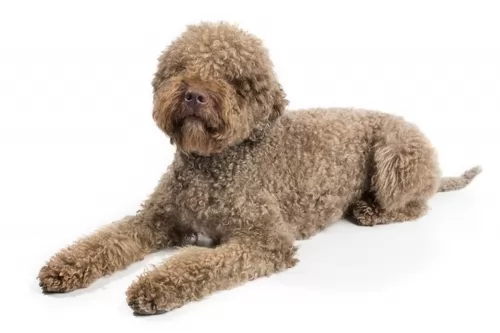 The Lagotto Romagnolo dog, known as the Water Dog of Romagna, and falling into the sporting dog category, is a pure breed dog which comes from the Romagna region of Italy.
The Lagotto Romagnolo dog, known as the Water Dog of Romagna, and falling into the sporting dog category, is a pure breed dog which comes from the Romagna region of Italy.
The dog’s role was that of gun dog and to retrieve water birds. Today he is more used as a truffle hunter in Italy as well as being used for a therapy dog.
In 2015 the Lagotto Romagnolo was accepted by the American Kennel Club into the sporting dog category.
 The Grand Bleu de Gascogne is a large dog, standing at 65–72cm with the female usually being slightly smaller at 62–68cm. The dog weighs about 36 to 42kg.
The Grand Bleu de Gascogne is a large dog, standing at 65–72cm with the female usually being slightly smaller at 62–68cm. The dog weighs about 36 to 42kg.
He has a lean, muscular body with long legs, long ears and with a strong, noble appearance. The coat is short and smooth and the color of the coat is white and black mottled. In some instances, there'll be large patches of black over the back of the dog. The head and neck area can also be black. There are tan markings above each eye.
This is a gentle dog, not aggressive at all, and he just wants to get on with hunting. He is a social dog and loves to be around other familiar dogs and his human family. He essentially wants to live in the country where he can be busy and active with tasks to do.
If you leave him alone for too long, he becomes frustrated and resorts to baying. He can get on well with adults and children in the home, but tends to be aloof around strangers. He is an intelligent animal, and training and socialization will be important for him, especially since he is independent and likes doing things his way.
The training will make him obedient and he'll always know how to behave well around strangers.
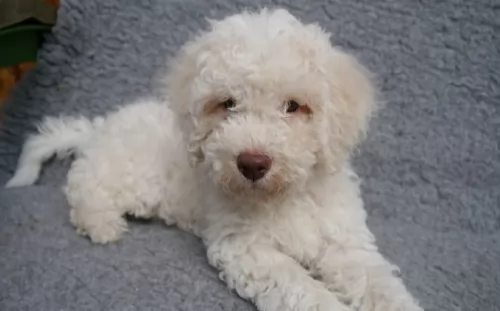 The Lagotto Ramagnolo is a medium sized dog where both males and females stand anything between 41 and 48cm and weigh 11 to 16kg.
The Lagotto Ramagnolo is a medium sized dog where both males and females stand anything between 41 and 48cm and weigh 11 to 16kg.
He is well proportioned and muscled, he has large yellow or brown eyes with a black or brown/pinkish nose, floppy, rounded ears and a tail which is left long these days.
The Lagotto Romagnolo has a waterproof double coat with a woolly texture and which hardly sheds, putting him as being hypoallergenic.
The coat can be in a number of different colors such as cream, grey, white, apricot, brown or tan. The face of the dog has a bit of a beard as well as noticeable bushy eyebrows.
Because the Lagotto is a sporting breed, he has had to call on all his senses to retrieve water birds. Good eyesight, sharp listening skills and an excellent sense of smell makes him the ideal gun dog but he also makes a loyal family pet.
He makes a good playmate for children and he happily gets on well with other pets in the home. Being an intelligent dog, he is easy to train too.
The sporting past of his has made it that he isn’t a couch-potato type of dog and he will require mental- and physical stimulation. His role as gun dog meant that he was required to retrieve birds in water, and he is an excellent swimmer and will happily plunge into water to join you in a swim.
Have him trained and socialized and you’ll find him tuned in to obeying your commands. Because of his smallish size, the Lagotto can adjust well to life in the city or in the countryside, just so long as he still receives his full quota of exercise.
 Your beautiful hunting dog is active and social and just loves to be out and about following a scent with other hunting dogs. This is what he absolutely loves to do.
Your beautiful hunting dog is active and social and just loves to be out and about following a scent with other hunting dogs. This is what he absolutely loves to do.
These days, apart from just hunting, he is also kept as a pet. He makes a good family companion because he is a non aggressive, gentle, even-tempered pet. Some of these dogs tend to be more reserved in nature. However your dog turns out, he can be your special friend when you give him all the exercise, nutrition and love that such a loyal dog deserves.
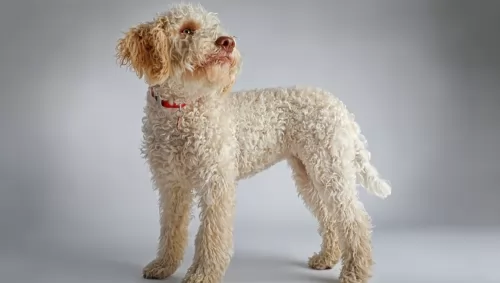 Many dog lovers appreciate that the Lagotto Romagnolos is looked upon as an allergy-friendly dog with his non-shedding coat.
Many dog lovers appreciate that the Lagotto Romagnolos is looked upon as an allergy-friendly dog with his non-shedding coat.
Being a medium sized dog, he is manageable too. Add to that excellent characteristics such as being amicable, friendly and loving. Training him some important, basic commands won’t be difficult either and you can add in intelligence to his list of good qualities.
As loving dogs, they are dedicated to their families, getting on well with children in the home as well as with other pets. He is a social dog and just longs to be a treasured member of the family like anybody else.
Count him in with all your activities and you’re going to have a one-in-a-million undemanding and contented canine friend.
 As a dog not known for inherited health problems, the Grande Bleu de Gascogne, with good care, can live to be 12 years of age.
As a dog not known for inherited health problems, the Grande Bleu de Gascogne, with good care, can live to be 12 years of age.
Just like with other dog breeds, there are some conditions to which this dog may also be prone, and hip dysplasia is one.
The average litter size for the Grande Bleu de Gascogne is 4 to 7 puppies. It is important to prevent your puppy growing too quickly because this is precisely what leads to musculoskeletal problems as an adult.
If you're concerned about this, speak to your vet, as you want to do your best to prevent hip problems in the future.
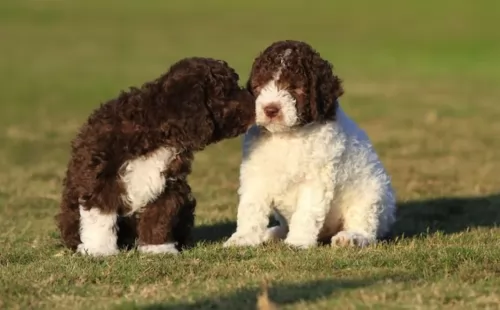 Lagotto live roughly 16 years with the best food, exercise and loving environment. Some health issues may well crop up, though unlikely, but it is good to be aware of them.
Lagotto live roughly 16 years with the best food, exercise and loving environment. Some health issues may well crop up, though unlikely, but it is good to be aware of them.
You hear the words ‘Hip dysplasia’ being bandied about a lot in the world of dogs because it is such a common dog ailment. Your dog can’t be cured but there are a range of management options that will ensure your pet remains as comfortable as possible.
It is such a common joint disease where the hips partially dislocate. Without veterinary intervention, it can be debilitating and painful. It is essentially a genetic condition but diet and environmental factors can come into play too.
You don’t want your pet putting on too much weight as this puts extra strain on the joints.
Your dog has loss of function because of the degeneration of cells or tissues. The illness affects different parts of the brain in dogs. You’ll notice a mild tremor of the head and uncoordinated movements. Your vet will want a history of your pet’s health as well as lab tests.
 Known for his hunting skills, the Grande Bleu de Gascogne has high exercise requirements. Although a walk is wonderful for him, it won't be enough. If you have a large garden, which will be ideal for him, throw the ball so he can fetch it. If you go cycling or jogging, he'll thank you for including him in these.
Known for his hunting skills, the Grande Bleu de Gascogne has high exercise requirements. Although a walk is wonderful for him, it won't be enough. If you have a large garden, which will be ideal for him, throw the ball so he can fetch it. If you go cycling or jogging, he'll thank you for including him in these.
The Grand Bleu’s short coat is conveniently low maintenance too so you aren't going to be spending anything on professional grooming. Give him a brush twice a week to remove loose hairs and to keep his coat silky and shiny.
Their long ears should be checked regularly for a build up of wax and dirt. Dampness can also be a problem if he loves to go swimming. You can buy special ear-cleaning-for-dog products. Never probe deep in the ears as you can damage them. Rather get advice from your vet or professional groomers on how to keep the inside of his ears clean and free from infection.
An energetic hunting scentdog like this requires high quality food with some raw meat added in from time to time. He must always have access to fresh, cool water.
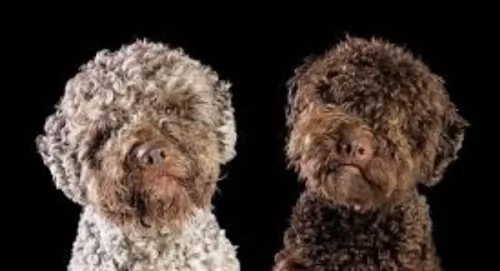 Not everyone agrees with how to take care of the Lagotto’s rough, waterproof coat of thick curls. The coat doesn’t shed much but it can pick up grass and small twigs easily. Unless brushed out at least 2 or 3 times a week, the coat can become matted and unruly. For many the coat needs to be trimmed regularly.
Not everyone agrees with how to take care of the Lagotto’s rough, waterproof coat of thick curls. The coat doesn’t shed much but it can pick up grass and small twigs easily. Unless brushed out at least 2 or 3 times a week, the coat can become matted and unruly. For many the coat needs to be trimmed regularly.
The Lagotto needs plenty of exercise. His hunting and retrieving past has given him a natural urge to retrieve and he loves going after every ball you throw him. He will also love to join you on your daily walks and it gives him the chance to sniff around. With swimming being added in, this dog is your true sporting buddy.
Make sure you feed your Lagotto the very best quality food there is to ensure his well-being and longevity. If you're unsure about whether he is getting in all the necessary vitamins and minerals with his food, speak to a dog expert as good food is key to a happy, healthy dog.